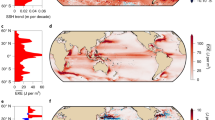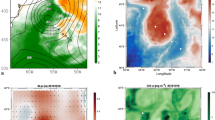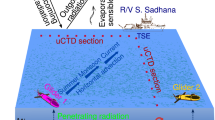Abstract
An outstanding problem in the oceanic and atmospheric sciences is the rate of heat and fresh water transport from the equator to the poles, for it is this transport which powers the Earth's weather and climate system1. Closing the Southern Hemisphere balances has proven particularly difficult because of the dominance of eddy fluxes across the Antarctic Circumpolar Current (ACC). Their relatively small space, but long time scales, make any in situ measurement program prohibitively expensive. Here we use satel-lite data to estimate the overall eddy activity and a turbulence closure scheme to relate this to eddy flux. The resulting estimated heat flux is sufficient to supply the heat lost to the atmosphere south of the Antarctic Polar Front. Estimated salinity flux is found to be poleward at high latitude—in the wrong direction to com-pensate for the observed excess of precipitaton over evaporation south of the Polar Front.
This is a preview of subscription content, access via your institution
Access options
Subscribe to this journal
Receive 51 print issues and online access
$199.00 per year
only $3.90 per issue
Buy this article
- Purchase on Springer Link
- Instant access to full article PDF
Prices may be subject to local taxes which are calculated during checkout
Similar content being viewed by others
References
Charnock, H. Q. Jl. met. Soc. 113, 3–18 (1987).
Gordon, A. L. & Owens, W. B. Rev. Geophys. 25, 227–233 (1987).
Newton, C. W. Meteorology of the Southern Hemisphere, Meleorol. Monogr. 13, 215–246 (American Meteorological Society, Boston, 1972).
Bryden, H. L. J. mar. Res. 37, 1–22 (1979).
Trenberth, K. E. Dyn. Atmos. Oceans 4, 57–64 (1979).
Hastenrath, S., J. phys. Oceanogr., 10, 159–170 (1980).
DeSzoeke, R. A. & Levine, M. D. Deep-Sea Res. 28, 1057–1085 (1981).
Gordon, A. L., J. geophys. Res. 86, 4193–4197 (1981).
Palmen, E. & Newton, C. W. Atmospheric Circulation Systems (Academic, New York, 1969).
Holloway, G. Nature 323, 243–244 (1986).
Holloway, G. & Kristmannsson, S. S. J. Fluid Mech. 141, 27–50 (1984).
Fu, L.-L. Rev. Geophys. Space Phys. 21, 1657–1666 (1983).
Freeland, H. Nature 326, 524 (1987).
Levitus, S. Climatological Atlas of the World Ocean NOAA Prof. Paper 13, 1973 pp (U.S. Govt. Printing Office, Washington, 1982).
Newell, R. E., Vincent, D. G., Dopplick, T. G., Ferruzza, D. & Kidson, J. W. in The Global Circulation of the Atmosphere (ed. Corby, G. A.) 42–90 (Royal Meteorological Society, London, 1969).
Gordon, A. L. & Taylor, H. W. Numerical Models of Ocean Circulation (National Academy of Science, Washington, D.C., 1975).
Author information
Authors and Affiliations
Rights and permissions
About this article
Cite this article
Keffer, T., Holloway, G. Estimating Southern Ocean eddy flux of heat and salt from satellite altimetry. Nature 332, 624–626 (1988). https://doi.org/10.1038/332624a0
Received:
Accepted:
Issue Date:
DOI: https://doi.org/10.1038/332624a0
Comments
By submitting a comment you agree to abide by our Terms and Community Guidelines. If you find something abusive or that does not comply with our terms or guidelines please flag it as inappropriate.



